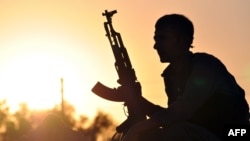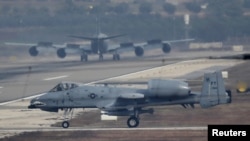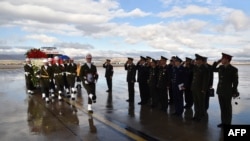For months the U.S. has sought to keep up appearances when it comes to relations with Turkey, striving to downplay disputes with Ankara and to mask discord. But a dispute over the best way to defeat the Islamic State terror group is exposing how much at cross-purposes the two countries are — risking longer-term harm to the U.S.-Turkish strategic alliance, say analysts.
A major Kurdish-led ground campaign backed by Washington to seize a swath of territory in northern Syria from the jihadist group close to the border with Turkey has sparked the latest spat. It is fueling Turkish accusations that the Obama administration is flipping sides, choosing the Kurds over the Turks and in the process encouraging, if inadvertently, Kurdish separatist ambitions in the region.
On Tuesday, Deputy Prime Minister Numan Kurtulmuş upped the ante in the flare-up, arguing Washington will have to choose between Ankara and the Democratic Union Party, or PYD, the Syrian Kurdish party which is an offshoot of Turkey’s own outlawed Kurdistan Workers’ Party, or PKK.
In the end, he told reporters, the U.S. will have to choose “either to continue its long-standing NATO alliance” or “establish [a] new alliance with forces which are known to be against Turkey.”
Differing priorities
The two governments have long held very different views of the priorities in Syria, with the Americans determinedly focused on defeating IS and the Turks arguing the best way to undermine the jihadists is to oust President Bashar al-Assad. The latter view is shared by the mainstream rebel movement in Syria.
Turkish officials deny claims made by their American counterparts that Ankara gave approval for an assault on the so-called Manbij pocket west of the Euphrates River by the U.S.-supported and Kurdish-led Syrian Democratic Forces, or SDF.
For Turkey, a successful operation in the Manbij pocket by the SDF, an alliance that besides the Kurds includes small Sunni Arab militias and Turkmen and Syriac community-defense forces shunned by anti-government rebel groups, risks legitimizing the Kurdish People’s Protection Units, or YPG, the PYD’s militia.
U.S. officials once again are trying to downplay disagreements with Ankara, insisting that they do understand Turkish fears about the rising power of the PYD.
“We also have a strong relationship with Turkey, and Turkey - as I’ve said many times, this isn’t some esoteric discussion for them. It’s right along their border. It’s real,” U.S. State Department spokesman John Kirby said in Washington Tuesday, in an apparent effort to mollify the Turks.
U.S. officials insist that they don’t support Kurdish separatist ambitions. Still, they argue the YPG is an effective partner on the ground against IS and that Washington will continue to work with the SDF and shouldn’t have to choose between the PYD and Ankara.
This has only stirred up Turkish frustration. Ankara interprets the soothing words as brushing aside its complaints.
“Our sensitivity toward the PYD has not been taken seriously by the U.S.,” Deputy Prime Minister Kurtulmuş complained.
Could the Turkish-U.S. dispute escalate, leading to Ankara breaking with Washington?
No observer thinks that will happen. But some analysts argue the dispute over Washington’s support of the PYD does risk doing some serious harm. They argue the Obama administration appears to take the view that all other quarrels in the region - like the one between the Turks and the Kurds - are irrational and shouldn’t be allowed to get in the way of the more important task of defeating IS.
“This most recent episode is an indication of an increasingly dangerous trend whereby the U.S.' exclusive focus on fighting the Islamic State of Iraq and the Levant is leading to tactical alliances with sub-state actors on the ground that threaten larger strategic relationships with traditional U.S. allies,” argues Kadir Ustun, executive director of the SETA Foundation, a think tank based in Washington.
Russia fears outweigh frustrations with US
For Gonul Tol, an analyst at the Middle East Institute in Washington, another research center, Ankara could never afford to escalate disagreements to the point of breaking with Washington. “Turkey’s regional troubles and vulnerabilities are making NATO membership much more valuable for Ankara,” Tol argued this week in a commentary for the New York Times.
Turkish fears about Russia outweigh frustrations with Washington, she says.
Turkish-Russian tensions have mounted since Turkish warplanes downed a Russian along the Turkish-Syrian border last November. The dispute has featured tough rhetoric and calculated threats as well as the introduction of retaliatory measures.
Russian sanctions for the downing of the jet include visa restrictions on Turks, import bans, the ending of charter flights from Russia to Turkey and even a ban on Russian football clubs employing new Turkish members.
This week saw another round in the war of words between Ankara and Moscow. Turkish officials lambasted Russia for an airstrike on a hospital in Idlib, Syria. Russian officials countered by demanding the Turks withdraw troops from northern Iraq immediately.
More alarmingly, there are signs that Moscow, which is demanding an apology for the shooting down of its jet and compensation, could be engaging in what analysts call “proxy escalation.”
Last month, PKK fighters shot down a Turkish Cobra military helicopter in southeastern Turkey, killing two pilots. The helicopter was downed with a Russian-made hand-held missile. That came just two weeks after a Russian lawmaker warned that Moscow could decide to arm the PKK.






